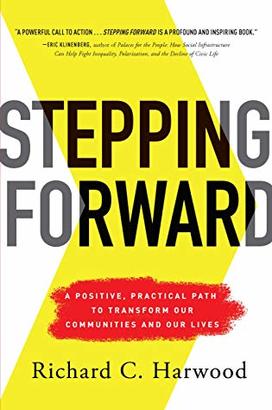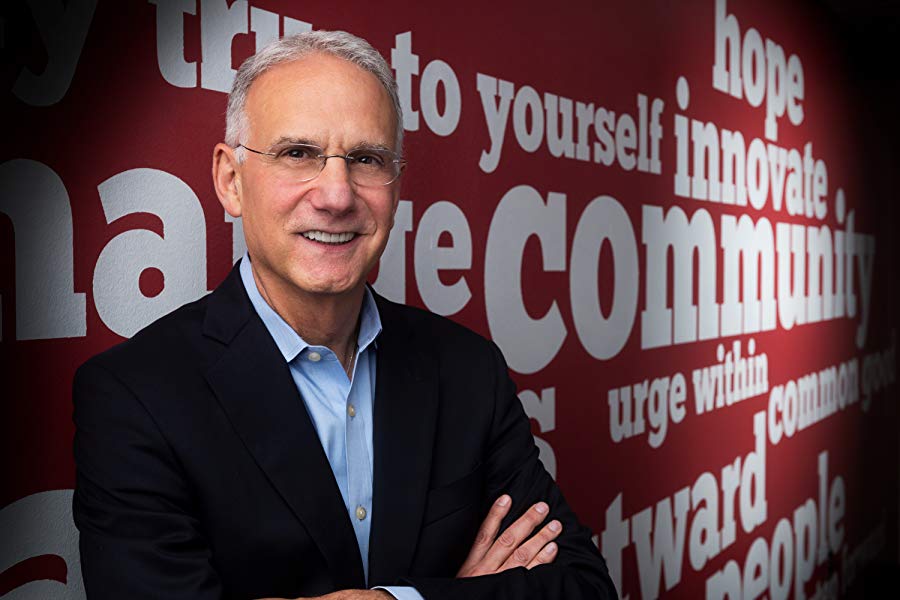Richard C. Harwood *84 Promotes Purposeful Community-Building in ‘Stepping Forward’
The book: Research and experience both show that America is becoming more divided. People are more partisan, more tribal, and less trusting. Faced with such division, Richard C. Harwood *84 believes the way to rebuild unity is methodically and purposefully – by individuals taking steps to better their communities.
Stepping Forward: A Positive, Practical Path to Transform Our Communities and Our Lives (Greenleaf) is a guidebook to these steps. With chapters focusing on core principles of community-building, such as “Turn Outward” and “Value the Human Spark”, Harwood invites readers to adopted a community-focused mindset and act upon it. His insights are buttressed by his own stories of unity-building through his work at the Harwood Institute.

The author: Richard C. Harwood *84 is the founder and president of the Harwood Institute for Public Innovation in Bethesda, Md., where he has spent more than 30 years developing a philosophy and practice of how communities can solve shared problems, create a culture of shared responsibility, and deepen people’s civic faith.
Opening lines: For as long as I can remember, my favorite words in the Bible have been Here I am. These three tiny words hold huge meaning not only for people of religious faith but also for those of us concerned about our shared ability to create the kinds of communities and lives we want. At this moment, in America, these three words call on us to engage with one another—to take greater responsibility for where we are and who we can become.
The words Here I am appear repeatedly throughout the Bible — from Abraham to Samuel to Isaiah, and elsewhere. But the story this phrase reminds me of most involves Moses. Standing before the burning bush, at first trembling and hiding his face, he ultimately answers God’s call by saying, “Here I am.”
In that moment, Moses — who doubts his capabilities, his strength, his own voice, his identity — does something that is desperately needed in our communities and our country today. In his moment of trial, Moses makes himself visible. He does not hide. He does not turn away. He does not seek cover. He makes an active choice to be present.
Then God gives him a great task: Go to the mighty Egyptian pharaoh and demand the release of the Israelites from the bonds of slavery. But in the face of this task, Moses hesitates. He asks God, “Who am I?” Once more, his self-doubt is palpable. He is filled with confusion. He thinks he is unworthy. But, as we know, Moses proves otherwise. He heeds the call. He steps forward. He acts. What are the implications of Moses’ words and actions for each of us today? Indeed, what about us? Will we act?
At the burning bush, Moses is asked to take an action that none of us will be called to do, but we can still learn from his story. When he hears the call, he personally makes an active choice. He chooses to step forward. He engages. He shows his face.
He accounts for himself too. There is something uniquely powerful in this personal act. In our society, accountability often means following laws, achieving certain measurable goals, or making formal reports. What I love about the story of Moses and the burning bush is that the idea of accounting for oneself takes on a much larger, deeper meaning. It asks each of us to assume full responsibility for who we can become and what we must do. It summons us to measure ourselves based on whether we are living up to the pledges and promises we have made to ourselves and to others. This is not about a typical professional accountability. It is a covenant we make with one another about the kind of world we seek to create together.
Reviews: “Many people are distressed by today’s bitter divisiveness and feeling powerless to affect the forces shaping their lives. Rich offers up a set of simple but profound insights for making a difference, drawn from a lifetime of reflection and working in communities around the country. This is a powerful and timely book.” — David Mathews, President, Kettering Foundation












No responses yet